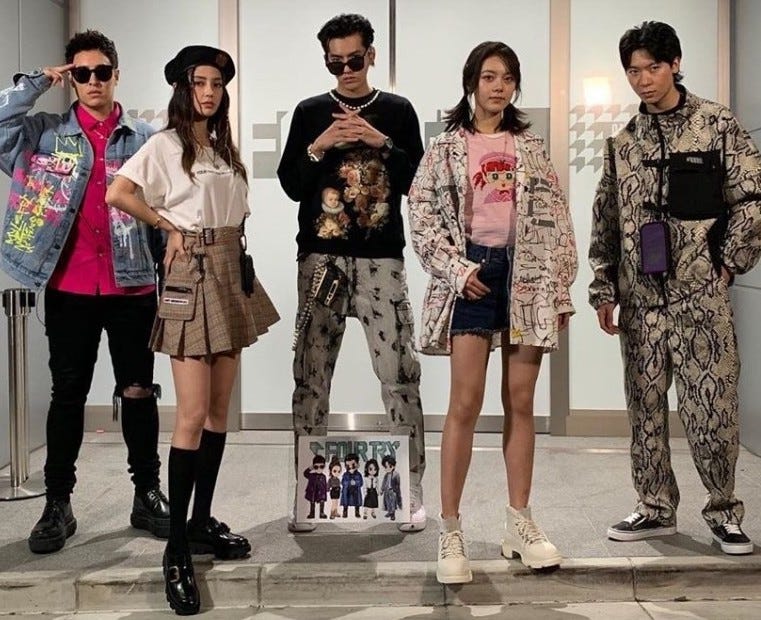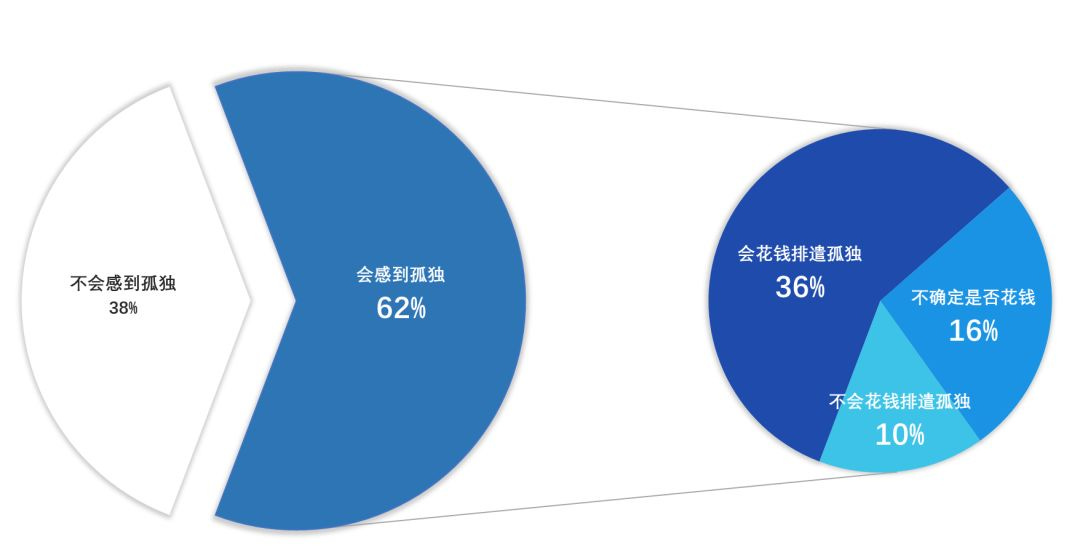China's 5G Rollout to the Rescue?
Plus: The Future of Livestreaming E-Commerce, Sci-Fi Beauty, and Report Corner.

China’s 5G rollout has been proceeding apace, with the government promoting the technology upgrade as a catalyst for economic growth in the wake of a severe coronavirus-related contraction.
Now, 5G is getting the dramatic treatment from Tmall, which recently held a Super Brand Category Day for 5G smartphones, with participation from major producers such as Huawei, Oppo, Samsung, and Vivo. The e-commerce platform released a suspense-tinged interactive series in three episodes starting on April 21.
“G Speed Support Bureau” (G速救援局) stars the popular young actress Tan Songyun as the head of the titular department. Her stylishly dressed character helps consumers upgrade to 5G so that they can enjoy 4K video streaming and online games and livestreaming, while also fighting against a 4G “villain.”
Interactive features require viewers to push the narrative forward by completing certain actions and engaging virtually with 5G smartphones. For example, in the first episode, users can help Tan’s character restore power by operating a Huawei P40 model. Other scenes highlight the phones’ camera features in detail by zooming in with powerful lenses or capturing clear images in low-light situations.
The series has garnered more than a million views within the first three days of its release on the Tmall and Taobao apps, while the Weibo topic of “Tan Songyun’s adorable fierce face” (谭松韵奶凶脸) has been viewed more than 230 million times.
The creation of the series is part of a much bigger push by Tmall to develop engaging and entertaining content around Super Brand Day campaigns, as we’ve seen in recent weeks with the reality shows created for MAC Cosmetics and YSL Beauty.
Read more in Chinese from SocialBeta and PR 007.
Mentioned in today’s newsletter: GQ China, Huawei, L'Oréal, Li Ning, MAC Cosmetics, Oppo, Samsung, Vivo, YSL Beauty.
Have a story tip, article to contribute, or just want to say hello? Contact Content Commerce Insider today!
E-commerce Reality Shows Go a Step Beyond Livestreaming

The rise of China’s online influencers has spread beyond livestreaming, with both television networks and video streaming platforms feeling the pull of e-commerce integration. Leading livestreamers such as Viya and Li Jiaqi have been a big draw when they appear on Chinese reality shows, and this year commercially-oriented reality television is set to get a major boost from a slate of new productions.
At least 12 e-commerce oriented shows are planned for release in 2020, many following either a trend-focused approach building on the success of iQiyi’s recent “Fourtry” (潮流合伙人, which saw celebrities running a streetwear boutique in Tokyo) or leveraging the growing interest in the role of influencers (aka key opinion leaders, or KOLs)
In addition to a second season of “Fourtry,” iQiyi has a more directly sales-oriented show in the works. “The One” (我是带货官) is billed as the first reality show focused on the emerging profession of e-commerce livestreamer, and will see top sellers and celebrities working with contestants who will compete for the title of “top sales influencer.” Another reality show will look at the lives of internet celebrities with Viya and Teacher Xu among its guests.
Tencent Video is producing second seasons of two shows built around the cosmetics industry: “Lipstick Prince” (口红王子) and “Miss Beauty” (Beauty小姐), as well as a marketing competition series, “Code Name Plan K”(代号K计划).
With Alibaba as its parent company, it should be no surprise that Youku has big plans to develop more shoppable video content. It has five commercially oriented shows in the works, including three with a product recommendation focus, a travel show hosted by style influencers, and an e-commerce competition program.
Part of Mango TV’s “Big Mango Plan” aims to give KOLs e-commerce sales training, and the streaming platform has lined up several brand partners to date. A new reality show, “You From the Mobile Phone” (来自手机的你) is an interactive talk show starring Viya discussing how smartphones have changed the way we live. Read more in Chinese from Media Internal Reference
“National Trend” Regains Momentum After Coronavirus

Last year, guochao, or “national trend” (国潮) became one of China’s top marketing buzzwords, reflecting a greater interest in domestic brands such as Li Ning among young consumers who no longer see homegrown products as inferior to imported goods, and instead take pride in doing their part to support “made in China.”
Culturally-oriented collaborations (wenchuang, 文创 ) with institutions such as the Palace Museum have helped to imbue guochao products with China’s traditional heritage in novel ways that appeal to Gen Z and millennial shoppers, who are the core demographic for these goods.
In the post-coronavirus era, more domestic brands may be looking to tap into the guochao trend as consumers are exhorted to do their part to rebuild the economy by supporting local brands.
Tmall has been promoting domestic brands such as Nayuki Tea with an ongoing guochao campaign this spring, and Chinese brands represent an estimated 80% of sales on the platform.
But brands must continue to innovate on the guochao front, understanding how Gen Z and millennial consumers can relate to their brand values, maintaining cultural relevance and working with influencers to promote products and elevate brand perceptions. Read more in Chinese from Media 360.
Brand Film Pick: L'Oréal and GQ China Pair Up for Sci-Fi Beauty Treatment
Marrying star power with a suspenseful storyline, “Wrinkle, Women, Wonderful?” is an innovative brand film collaboration between L'Oréal and GQ China to promote a new product launch for the French beauty giant’s Revitalift line via Tmall.
The four-part series of short science fiction films is set in an alternate universe where a corporate entity known as WWW imposes a strict standard of beauty. Recalling a classic episode of the American series “Twilight Zone,” the ideal is a wrinkled “puppet face,” and women cursed with unlined skin may be forced into treatment, ostracized or worse.
A trio of popular actresses—Yi Song, Shu Chen, and Lan Yingying—take turns as the protagonists of the first three films, while idol and L'Oréal brand ambassador Zhu Yilong ties the series together with his role as a rebel scientist. Zhu’s character appears towards the end of the first three episodes engaged in some corporate espionage-type activity, followed by an interactive question for viewers about his role in the drama that offers a clue for the following episode.
The finale reveals his objective of promoting more diverse concepts of beauty, and his strategy of substituting WWW’s wrinkle-creating serums with L'Oréal products that have the opposite effect. The film ends with a beauty revolution taking place, although it despite the language of self-affirmation, it appears to largely reinforce the existing standards of Chinese beauty, in which pale skin and a youthful countenance are prized.
L'Oréal’s brand does not appear until the final episode, and even then its presence is fairly subtle—in true “content commerce” fashion—with products placed discreetly and its name glimpsed on bottles and during a shot of a product launch conference. But the heavy promotion on Weibo and Zhu’s fan base has drawn viewers, particularly for the final episode, which was released on Zhu’s birthday and racked up more than 2.8 million views (combined views for the Weibo hashtags associated with Zhu and the film series have exceeded 210 million).
Report Corner

Media 360 shares insights on China’s “singles economy” as a driver for consumption, with more than 70% of those who identify as part of the “solo culture” spending between RMB 1,000 to 5,000 ($141 to $707) on goods and services for themselves.
A report from TopKlout analyzes trends in China’s influencer market and how brands leverage their role on the major platforms including WeChat, Weibo, Douyin, Kuaishou, and Xiaohongshu.
News in English
Five pieces of advice for brands in China in the post-coronavirus era: Focusing on location and affluent customers are among the lessons. Business of Fashion
The fan economy has fueled record-breaking sales of idol Xiao Zhan’s new single, fueling concerns about irrational spending. Sixth Tone
Despite all the buzz about e-commerce livestreaming, it appears it still has a long way to go to make a significant impact on overall retail consumption, with one estimate saying it accounts for only 2% of online sales. CNBC
China Brand Day is going online this year. The annual trade event, which is focused on domestic products, will include interactive sessions, livestreamed broadcasts and VR exhibitions. Shine
The Beijing International Film Festival is also going virtual this year with an abridged program streamed via iQiyi running over the upcoming May 1 holiday period. Hollywood Reporter
A spate of scandals has hit some of China’s biggest tech brands with allegations of sexism, infidelities, and other inadvisable behavior by key executives. Radii
We’ve Got China Covered
China Film Insider: China’s Antitrust Law Doesn’t Seem to Apply to Internet Giants
Jing Daily: Meet Pinduoduo, Alibaba’s Newest Competition
Jing Travel: Survival Resources for American Cultural Institutions
Thank you for reading—we hope you’re all staying safe and healthy, and are set to enjoy a restful weekend. Ahead of our next newsletter on Tuesday, we’d appreciate you following CCI on Linkedin and helping spread the word!
